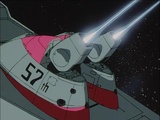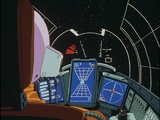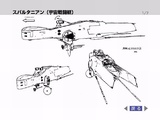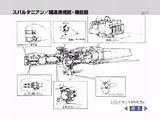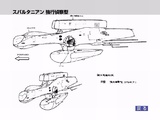Spartanian
From Gineipaedia, the Legend of Galactic Heroes wiki
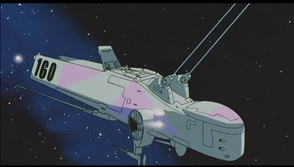 A Spartanian fighter | |
| Affiliation: | Free Planets Alliance |
| Type: | Space combat fighter |
| Purpose: | Space superiority and anti-ship strike role |
| Length: | 40 metres |
| Width: | 7 metres |
| Height: | 13 metres |
| Armament: | 2 twin-linked 4 cm laser cannons on dorsal mount 4 2 cm neutron beam cannons in front prow mounts or 4 cm Gatling guns or 4 8 cm rapid fire laser cannons or 4 2 cm fibre fletchette guns |
| Crew: | 1 |
Spartanians (Japanese: スパルタニアン) were small Alliance attack craft analogous to the Galactic Empire's Walküre fighters designed to intercept enemy warships and destroy them. Small, fast and highly mobile, these fighter craft were armed with powerful laser weapons that could cut through the armour of enemy warships at close range.
Contents |
Design
A Spartanian's main weapon consisted of a pair of dorsal turrets. Further weapon mounts were mounted in the bow. Sensor and communications arrays were mounted on the ventral surface of the ship. The cockpit was located towards the front of the hull. There was a clear canopy and an outer armoured casing that went over it. The clear canopy served as a screen and projected an image of the outside as if the armoured casing were invisible.
The thrusters of a Spartanian were, like larger Alliance ships, shielded by a long set of fins extending from the stern and surrounding the main vent.
Spartanians docked with the front of the craft projecting into a docking port, usually located on the ventral surface of its base ship, and separated by a retractable airlock. Launching Spartanians "dropped" out of their base vessels. On Alliance flagships, the docking parts were located on the sides of the ship and the Spartanian fighters were ejected out, rear first.
One of the first challenges for any pilot was getting their bearings after being separated from the carrier and transitioning from artificial gravity to zero gravity. It wasn't unusual for pilots during this crucial period to be immediately destroyed. As a result, control officers had to develop a sense of timing for when fighters wouldn't be in immediate danger.
A system known as Lullaby allows the Spartanians to dock with the carriers.
Pilots
Spartanians are keyed to individual pilots. In order to enter the cockpit, a pilot must present his ID card which contained information such as his name, rank, serial number, DNA sequence, ABO & MN blood types, fingerprints, and voiceprints. Once in the cockpit, the combat suit's helmet connected to an onboard computer. If the brain wave pattern from the helmet did not match the recorded brain wave pattern, the ship would issue a low amperage, high voltage shock which would render the unauthorized pilot unconscious.
Spartanians are stocked with enough provisions to keep a pilot alive for up to a week. Those provisions come in the form of salt tablets coated in fructose, concentrated vitamin fluid, tubes of royal jelly mixed with gluten and calcium injections. In the event of an emergency, they also had a resin spray to close up any hull fractures, signal flares, painkillers, germanium pills, and other medications.
The cost of training a pilot is estimated at three billion dinars by Commander Zeno during Yang's voyage to Heinessen just prior to the Eighth Battle of Iserlohn.
Gallery
Spartanian hangar (795 UC (486 IC / 3595 CE)) |
Spartanian cannons (800 UC (2 NIC / 491 IC / 3600 CE)) |
Spartanian cockpit (801 UC (3 NIC / 492 IC / 3601 CE)) |
Appendices
Background information
Spartanian is a mistranslation of Spartan.
Licensed sources
The Spartanian fighter was chosen in the beginning of 770 UC (461 IC / 3570 CE) to be the standard Alliance fighter, and afterwards went into large scale mass production at numerous facilities.
It used a high efficiency fusion turbine engine (IHJ-100 model). The reaction mass used was usually water.
Armament normally consisted of a dorsal mounted pair of lasers, and 4 frontal model NMG-5 neutron beam cannons. The large energy consumption of the neutron beam cannons limited total number of shots to a maximum of 10 shots. Alternative weapon loadouts were possible. There were also hardpoints on either side of the ship that could mount anti-ship missiles, multiple missile launchers, or large calibre electron beam cannons. However such options increased the mass and correspondingly increased fuel consumption.
The gatling gun option fired high density uranium-238 rounds at a fire rate of 140 rounds per second.
The most common method of usage was for the fighter to be launched from dedicated carriers, which used a half open hangar design with the rear of the fighter projecting into space. Landing was accomplished via laser sensors to gauge docking distance. (Data Book: Mechanic & Seiyū Encyclopaedia, p. 142, p. 178, p.180)
A long range reconnaissance variant existed. Crew size was increased to 2. It swapped its weapons for a dedicated suite of sensors and had an electromagnetic wave absorbing black coating. To enable extended long range operations, an extra fuel tank was mounted and a simplified cold sleep system was available for the crew. (Data Book: Mechanic & Seiyū Encyclopaedia, p. 142, Mechanical Photo File, p. 59)
Apocrypha
DVD features
Sketches of the Spartanian fighter appears in the extra features of the DVD box set.

